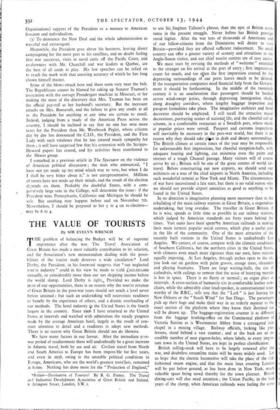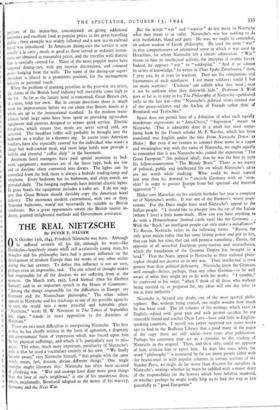THE VALUE OF TOURISTS
By SIR EVELYN WRENCH
THE problem of balancing the Budget will be of supreme importance after the war. The Travel Association of Great Britain has made a most valuable contribution to its solution, and the Association's new memorandum dealing with the possi- bilities of the tourist trade deserves a wide circulation.* Lord Derby, the President, in his foreword suggests that " our neglected tourist industry " could in his view be made to yield Ltoo,000,000 annually, or considerably more than our net shipping income before the world slump. Lord Derby is right.. Provided we make the most of our opportunities, there is no reason why the tourist revenue of Great Britain in the post-war years should not reach a level never before attained ; but such an undertaking will necessitate readiness to benefit by the experience of others, and a drastic overhauling of our methods. The hotel industry ip the United States is the fourth largest in the country. Since 1906 I have returned to the United States at intervals and watched with admiration the steady progress made by the average American hotel, largely as the result of con- stant attention to detail and a readiness to adopt new methods. There is no reason why Great Britain should not do likewise.
We have many factors in our favour. After the immediate post- war period of readjustment there will undoubtedly be a great increase in Atlantic travel, both by sea and air. Civilian travel from North and South America to Europe has been imposshle for five years, and even in 1938, owing to the unstable political conditions in Europe, Americans, who are the world's greatest travellers, remained at home. Nothing has done more for the " Projection of England,"
*Britain—Destination of Tourists? By R. G. Pinney. The Travel and Industrial Development Association of Great Britain and Ireland. 6 Arlington Street, London, S.W. t. to use Sir,Steplien Tallents's phrase, than the epic of British rests. tance in the present struggle. Never before- has British prestige stood higher. After the war tens of thousands of Americans and of our fellow-citizens from the Dominions will desire to visit Britain—provided they are offered sufficient inducement. No small country can offer a greater variety of scenery and attractions to the Anglo-Saxon visitor, and our chief tourist centres are of easy access.
We must start by revising the methods of " welcome " extended to the stranger on his arrival at the port of entry ; first impressions count for much, and too otten the first impression created by the depressing surroundings of our ports leaves much to be desired. If the transportation companies need financial help from the Govern- ment it should be forthcoming. In the middle of the twentieth century it is an anachronism that passengers should be herded across wind-swept jetties, through depressing immigration sheds, along draughty corridors, where lengthy baggage inspection and passport formalities take place. The imaginative architect and hotel decorator should be employed. I still recall the attractive mural decorations, portraying scenes of national. life, and the cheerful colcur scheme, in a comfortable restaurant at a Swedish port, where meals at popular prices were served. Passport and customs inspections will inevitably be necessary in the post-war world, but there is no reason why they should take p*e in drab and dreary surroundings. The British climate at certain times of the year may be responsible for unfavourable first impressions, but cheerful reception-halls, with adequate heating and lighting, can minimise even the pains and stresses of a rough Channel passage. Many visitors will of course arrive by air ; Britain will be one of the great centres of world air- travel. Before constructing our new airports, we should send our architects on a tour of the chief airports in North America, including such wonderful termini as New York and Miami. The circumstances of war have necessitated-a late start, but there is no valid reason why we should not provide airport amenities as good as anything to be found in the United States.
In no direction is imaginative planning more necessary than in the 'rebuilding of the main railway stations in Great Britain, a stupendous undertaking, but long overdue. The traveller in Great Britain, if he is wise, spends as little time as possible in our railway stations, which judged by American standards are forty years behind the times. Vast sums have been spent'by American railroads in making their main termini popular social centres, which play a useful part in the life of the community. One of the most attractive of the recently built stations in the United States is undoubtedly Los Angeles. We cannot, of course, compete with the climatic conditions of Southern California, but the northern cities in the United States, with climates even much more rigorous than our own, have stations equally imposing. At Los Angeles, through arches open to the air, you look out on gardens with palm groves, orange trees, oleanders and playing fountains. There are large waiting-halls, the size of cathedrals, with ceilings so remote that the noise of hurrying mortals is lost in space. There is no flurry or turmoil ; an organ plays at intervals. A cross-section of humanity sits in comfortable leather arm- chairs, while the admirably clear loud-speaker, in conversational tones worthy of the B.B.C., tells you that the "Lark " is just leaving for New Orleans or the " South Wind " for San Diego. The passengers pick up their bags and make their way in an orderly manner to the exact section of the platform where they know 'their destined car will be drawn up. The baggage-registration counter is as different 5 from the luggage booking-office on the Continental platform of Victoria Station as is Westminster Abbey from a corrugated iron chapel in 'a mining village. Railway officials, looking like pro- fessors, stand behind a vast counter, and at the back are an in- 2 credible number of neat pigeon-holes, where labels, to every impor- tant town in the United States, are kept in perfect clastification.
British rolling-stock will have to be largely renewed after the s war, and doubtless streamline trains will be more widely used. Let t us hope that the electric locomotive will take the place of the old- fashioned steam engine, and that the main lines entering London e will be put .below ground, as has been done in New York, much o valuable space being saved thereby for- the town planner. British t dining-cars will also need attention ; the Union Pacific, in the lean v years of the slump, when American railroads were feeling the ccm- petition of the motor-bus, concentrated on giving additional amenities and excellent food at popular prices to the great travelling public ; their-example was widely followed and a new era in railroad travel was introduced. In American dining-cars the service is now usually a la carte i meals as good as those served in ordinary restau- rants are obtained at reasonable prices, and the traveller with dietetic fads is specially catered for. Many of the most popular trains have carpeted dining-cars, with gay interior decorations, and coloured prints hanging from the walls. The name of the dining-car super- intendent is placed in a prominent position, for the management believes in personal touch.
When the problem of granting priorities in the post-war era arises, the claims of the British hotel industry will inevitably come high in the list. As far as the luxury hotel is concerned, Great Britain can, of course, hold her own. But in certain directions there is much room for improvement before we can claim that British hotels as a whole are up to the international standard. In the modern trans- atlantic hotel large sums have been spent in providing up-to-date equipment and pantries designed to ensure quick service. Electric hot-plates, which ensure that meals are never served cold, are universal. The breakfast coffee will probably be brought into the bedroom on a trolley in a thermos jug. In recent years American hoteliers have also especially catered' for the individual who wants a cheap but well-cooked meal, and most large hotels now provide a well-lit and cheerful " coffee shop " in the basement.
American hotel managers have paid special attention to bed- room equipment ; mattresses are of the latest type, beds are low and in daytime often converted into divans. The lights can be controlled from the bed, there is always a bedside reading-lamp and telephone. Every bedroom has its bathroom, and clean towels are provided daily. The hanging cupboards have internal electric lights.
In many hotels the equipment includes a radio set. I do not sug- gest that Great Britain should slavishly copy the American hotel industry. The enormous modern caravanserai, with two or three thousand bedrooms, would not necessarily be suitable to British conditions. But a great opportunity awaits the British tourist in- dustry, granted enlightened methods and Government assistance.



























 Previous page
Previous page